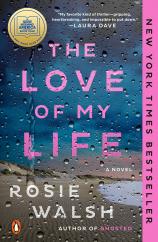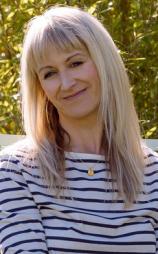Excerpt
Excerpt
The Love of My Life

One
Leo
Her eyelashes are often wet when she wakes, as if she's been swimming in a sea of sad dreams. "It's just some sleep-related thing," she's always said. "I never have nightmares." After a fathomless yawn she'll wipe her eyes and slip out of bed to check Ruby is alive and breathing. It's a habit she's been unable to break, even though Ruby's three.
"Leo!" she'll say, when she gets back. "Wake up! Kiss me!"
Moments will pass, as I slide into day from the slow-moving depths. Dawn will spread from the east in amber shadows and we will burrow in close to each other, Emma talking almost nonstop-although from time to time she will pause, midstream, to kiss me. At 6:45 we will check Wikideaths for overnight passings, then at 7:00 she will break wind, blaming the sound on a moped out in the road.
I can't remember how far into our relationship it was when she started doing this: not far enough, probably. But she would have known that I was on board, by then, that I was no more likely to swim back to the shore than I was to grow wings and fly there.
If our daughter hasnÕt climbed into our bed by that time, we climb into hers. Her room is sweet and hot, and our early-morning conversations about Duck are among the happiest moments my heart knows. Duck, whom she clutches tightly to herself all night, is credited with incredible nocturnal adventures.
Normally I'll dress Ruby while Emma "goes down to make breakfast," although most days she'll get sidetracked by marine data collected overnight in her lab, and it's Ruby and me who'll sort out the food. My wife was forty minutes late for our wedding because she'd stopped to photograph the tidal strandlines at Restronguet Creek in her wedding dress. Nobody, except the registrar, was surprised.
Emma's an intertidal ecologist, which means she studies the places and creatures that are submerged at high tide and exposed at low. The most miraculous and exciting ecosystem on earth, she says: she's been rockpooling since she was a young girl; it's in her blood. Her main research interest is crabs, but I believe most crustaceans are fair game. Right now she's got a bunch of little guys called Hemigrapsus takanoi in special sea-water tanks at work. I know they're an invasive species and that she's looking at some specific morphology she's been trying to pin down for years, but that's as much as I'm able to understand. Less than a third of the words biologists use can be understood by the average human; getting trapped in a group of them at a party is a nightmare.
Emma is singing to John Keats when Ruby and I arrive in the kitchen this morning, the sun jagging across the worktops and our cereal hardening in bowls. Her laptop, which displays a page of mind-boggling words and squiggles, plays a track called ÒKillermuffin.Ó When we rescued John Keats from the dog shelter they told us that jungle at a low volume soothed his nerves, and so it has become the soundtrack to our lives. IÕm used to it now, but it took a while.
I stand in the doorway with Ruby perched on my hip, watching my wife singing tunelessly to the dog. In spite of a bunch of musicians in Emma's ancestry she is incapable of singing even "Happy Birthday" in tune, but this has never stopped her. It's one of many things I love about my wife.
She catches sight of us and dances over, still singing appallingly. "My favorites!" she says, kissing us both and extracting Ruby from my arms. She whirls off with our daughter and the dreadful singing gets louder.
Ruby knows Mummy's been ill; she has seen her lose her hair thanks to the special medicine she gets at hospital, but she thinks Emma's better now. The truth of the matter is, we don't know. Emma had her post-treatment PET scan yesterday and an appointment to discuss the results has been booked for next week. We are hopeful, we are frightened. Neither of us is sleeping well.
After a brief stint dancing with her mother, Duck whirling around their heads, Ruby wriggles off to take care of some urgent business.
"Come back!" Emma cries. "I want to cuddle you!"
"I'm too busy," Ruby says, regretfully. Then: "Hi," she whispers, to the plant she's looking after for nursery. "I'm going to give you a drink."
"Anything?" I ask, nodding at the computer. Emma presented a BBC wildlife series a few years back and continues to receive messages from weird men, even though she hasn't been on telly since. But her series was repeated recently, and as a result the messages have increased. Normally, we laugh at them, but last night she admitted she's had some more disturbing ones of late.
"A couple more. One tame, one less so. But I've blocked him."
I watch her carefully as she fills our water glasses, but she doesn't seem bothered. I think it's fair to say I mind about these messages a lot more than she does. I've tried to get her to shut down her public Facebook page, but she won't. People apparently still post about wildlife they've been tracking, and she's not willing to close the resource down "simply because of a few lonely men."
I hope they are just lonely.
"I love your piece on Kenneth Delwych," Emma tells me, keeping an eye on Ruby, who's climbing up to the sink with her watering can. My newspaper is on the table with the obituaries page open.
I go over to John Keats and fold one of his flappy silken ears around my finger, waiting for the but. The dog smells of biscuits and singed fur after a recent encounter with the iron.
"But?" I prompt.
She stops, caught out. "No but."
"Oh, Emma. Come off it."
After a moment, she laughs. "Fine. I do love it, but the female priest is the real showstopper. Hey, Ruby, that's enough water."
John Keats sighs deeply as I lean over to study my articles. Kenneth Delwych, a peer famed for the legendary orgies he hosted at his Sussex vineyard, is sharing the obituaries page with a Bomber Command navigator and a female priest who had a heart attack during a wedding ceremony last weekend. "You're at your best when you're completely deadpan," Emma says. She puts bread in the toaster. "That actor last week-the Scottish one, what was his name? Ruby, please don't drown the thing . . ."
"David Baillie?"
"David Baillie. Yes. Perfection."
I reread my Kenneth Delwych piece while Emma deals with the inevitable overflow of water and soil from Ruby's plant. She's right, of course. The female priest, with her far shorter obit, reads better.
Unfortunately, Emma's often right. My editor, who, I suspect, is in love with my wife, often jokes that he'd sack me and hire her if she ever decided to quit marine biology. I actually find this quite offensive, because unless he's secretly read her scientific articles, he has only one piece she wrote for the Huffington Post to go on.
Emma is a research fellow at the Marine Biological Association in Plymouth, which takes up two days of her week, then she comes back to us in London to teach estuarine conservation at UCL. She is an excellent writer, with instincts frequently better than mine, and she really does enjoy cruising Wikideaths, but this has more to do with her love of a good story than any interest in stealing my job.
Ruby and John Keats go out into the garden, where the sun steals through gaps in next door's sycamore, spotting our tiny lawn with gold. Smells of an early city summer roll through the door: still-glossy grass, honeysuckle, heating tarmac.
I try to rehydrate our cereal, while outside the dog runs around our pond, barking. It's alive with baby frogs at the moment, which he seems to find unacceptable. "John Keats, will you be quiet?" Emma asks, from the doorway. The dog takes no notice. "We have neighbors."
"JOHN!" Ruby yells. "WE HAVE NEIGHBORS!"
"Shhh, Ruby . . ."
I find some spoons and take our breakfast out to the garden.
"Sorry," Emma says, holding the door open for me. "Me and my unsolicited opinions on your work. It must be annoying."
"It is." We sit at the garden table, still bobbled with dew. "But you're mostly polite. The main problem is that you're often right."
She smiles. "I think you're a brilliant writer, Leo. I read your obits before I even open my work e-mails in the morning."
"Hmmm." I keep an eye on Ruby, who's just a bit too close to the pond.
"I do! Your writing is one of your sexiest assets."
"Oh, Emma, seriously, stop it."
Emma has a spoonful of cereal. "Actually, I'm not joking. You're the best writer on that desk. Period."
Embarrassingly, I can't stop myself from beaming. "Thank you," I say, eventually, because I know she means it. "But you're still annoying."
She sighs. "Oh, I know."
"For a whole host of reasons," I add, and she can't help laughing. "You have far too many opinions on far too many things."
She slips her hand across the table and squeezes my thumb, and tells me I am her favorite, and I find myself laughing, too-and that is our rhythm. That is us. We have been married seven years; together nearly ten, and I know every part of her.
I think it was Kennedy who said we are tied to the ocean-that when we return to it, for sport or leisure or somesuch, we are returning to the place from whence we came. ThatÕs how I feel about us. To be near to my wife, to Emma, is to return to source.
So when I learn, in the days following this morning-this innocent, commonplace morning, with dogs and frogs and coffee and dead priests-that I know nothing of this woman, it will break me.
The Love of My Life
- Genres: Fiction, Mystery, Suspense, Thriller, Women's Fiction
- paperback: 384 pages
- Publisher: Penguin Books
- ISBN-10: 0593297016
- ISBN-13: 9780593297018







